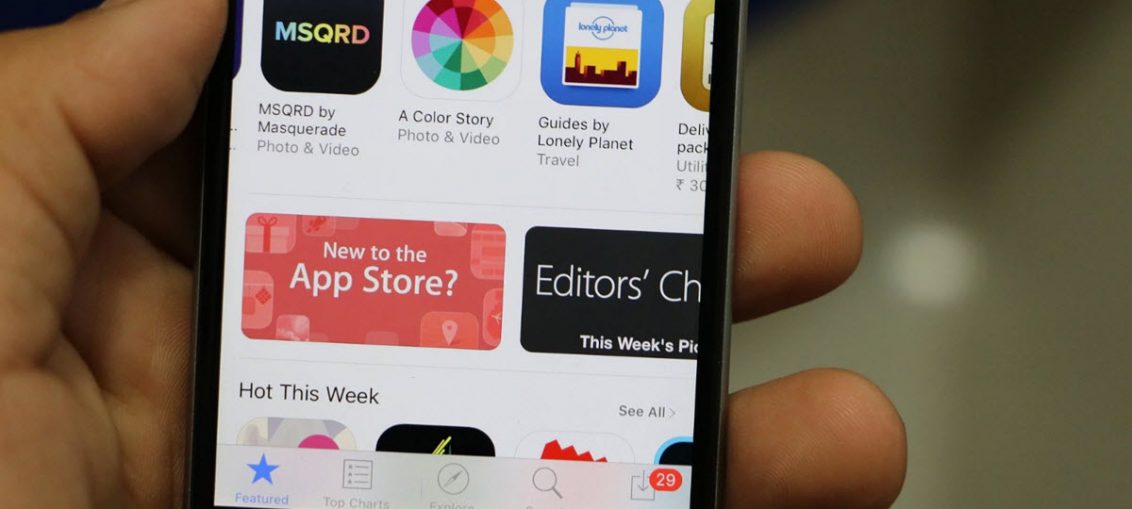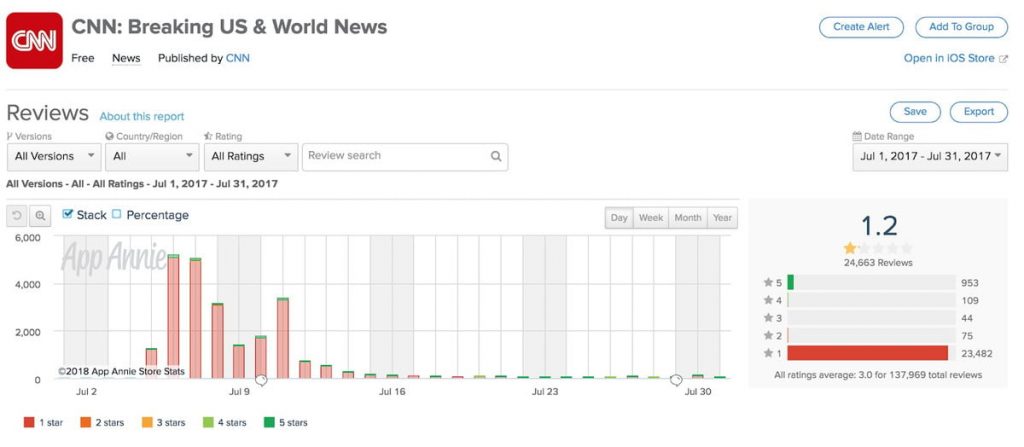As the popularity of smartphones increases, so does the volume of application development. To date, over 2 million applications are available in App Store, and in Google Play, the number of games and applications has exceeded 3.5 million. It is not surprising that with so many programs, users need help separating what they really need from useless dummies.

It is for this purpose that a rating system has been introduced in app stores. Once you've downloaded and tested the app, you can rate it on a 5-point scale and write a review to share your impressions. These reviews and ratings form the average app rating. Thus, the more users said they like the app, the better it is. At least that's how it should work.
In practice, many reviews do not help a potential buyer in any way, and some are completely fake. One star and a one-line comment that an app crashes or that a program isn't worth the money doesn't always guarantee that an app is really bad. But what about the other side App Store – a solid wall of 5-star ratings and homogeneous accolades?
Bypassing the system
Good ratings and reviews are vital for every developer looking to get their app to the top. They also increase the chances of appearing on Featured and other listings that drive sales. So it is not surprising that many developers are trying in every way to look for loopholes in the rules in order to get closer to the coveted high rating.
Paul Barnes, Head of Business Unit at App Annie, notes:
Although we have not yet completed our analysis to figure out the extent of the problem, fake reviews do exist and do affect the overall app ranking.
The very fact that many developers try to bypass the rules has been no secret for the industry for several years. You just have to search for 'paid app reviews' or something like that to find a variety of services that offer to add as many positive reviews to your app as you need. The cost of a review differs, as a rule, the more you order, the less you pay for each review.
And yes, it's against the rules. In terms of publishing applications, both Google Play and App Store, this practice is prohibited. A violation can lead to the removal of suspicious reviews, the removal of the application itself from the store, or even the developer's ban on further publication of applications.
Bots or humans?

Both Apple and Google demonstrate that they take this issue seriously and continually check the reviews that are posted on their respective platforms.
The problem is that distinguishing fake reviews from real ones is a daunting task. Most of the services we talked about hire real users to download applications and then write a review. If earlier this led to the fact that developers bought a bunch of shining positive reviews of the same type that could be easily calculated, now the scheme has become more complicated.
Now the developer can issue self-written texts for published reviews or discuss their tone when ordering a cheat, set the frequency of paid reviews in the store so that they do not follow one after another, ask to add a few 4-star reviews so as not to attract attention with solid fives. Some of these services even guarantee that they will replace the ad for free if a check removes it.
Instant failure
Andrew Ahn, Product Manager at Google Play, said:
We want reviews to be a true reflection of the opinions of users. Spam in reviews – including non-app comments, incitement, and obscene reviews – is far from everything you have to deal with when filtering. We also block fake and incentive reviews.
It is interesting to note that laudatory odes are not always paid for. Reviews can also be used to damage the reputation of competitors. Ahn continued:
There are two types of feedback stimulation. The first is buying good reviews about your product to promote it, and the second is buying negative reviews to hurt competing apps. We are removing both to keep the ecosystem transparent and fair.
Sudden success (as was the case with Flappy Bird, for example) is as suspicious as sudden failure – similar to what happened with the CNN app for iOS. In July 2017, a 'bombardment of reviews' began on his page at App Store – the app received extremely negative reviews for a whole week. If earlier the application received about 30 reviews a day, then from 5 to 11 July the number of only negative (!) Reviews amounted to several thousand.

It is unclear whether this attack was carried out using bots, or whether it was a planned campaign from the channel's competitors.
Crime and Punishment
Note that although reviews are constantly being removed, it is extremely rare for moderators to resort to removing applications from stores or to ban developers.
Simply deleting suspicious reviews is more like a police officer shaking his finger instead of arresting or issuing a fine, but this is understandable: if the creators did not actually use the services for promotion, it will be extremely difficult to prove this to unblock. Apple and Google don't want to be too hard on the developers. In addition, with tougher measures, it is highly likely that, instead of being bombarded with negative reviews, competitors will simply buy someone else's apps a thousand or two of positive reviews to block them in the store. This will lead not only to chaos, but also to distrust of the sites.
Here you can recall the story of the removal from App Store of a developer application called Dash and the suspension of the account of its creator. This is a rare case when the decision of the moderators was challenged – and, moreover, successfully. Apple stated that the developer paid for reviews of the app, but the situation was much more complicated. Here is what the developer himself said under the nickname Kapeli:
In fact, the following happened. 3-4 years ago I decided to help my relative in promotion by paying her membership in the Developer Program Apple with my credit card. I also gave her some of the testing equipment that I no longer used. Since then our accounts Apple have been considered linked. As soon as her account was caught in the manipulation of reviews, my account was blocked.
I had no idea that my account was linked to another until Apple contacted me 2 days after the account was closed. I have never received a warning of any violations before this happened.
The story eventually settled in Kapeli's favor.
A loophole in the rules
While developer buying reviews are increasingly difficult to spot, there is a more popular and obvious strategy that has been used by app (and especially game) creators for years. Surely you have come across something like this: you are playing something, and suddenly a tempting offer pops up on the screen: write a positive review and receive as a gift something that can usually only be bought for real money, or a certain amount of rare in-game currency. If a developer directly asks for a '5 stars' rating, then this again violates the rules of use Google Play and App Store, but here you can go for a trick.

Usually, applications ask for a rating in the form of a pop-up window that appears after a few minutes of use. These windows can appear with annoying regularity, so sooner or later you will still click on the rating so that they don't appear again. But this is where this scheme works. If you choose a good rating, then you will be taken to the store to write a review. But if you click a low rating – for some applications, this is anything below 5 stars – then you will be transferred to the developer's site, where you can describe what you did not like. Technically, this trick doesn't break anything, but Google Play is aware of it, and it is quite possible that it will be banned as well.
What to do?
There are no statistics on how many apps are removed from stores due to fake reviews, but in 2017 alone Google it removed over 700,000 apps from the Play Store. The reasons are different: most of them were fakes for popular games and programs, contained inappropriate content, or were found to be potentially malicious, but moderators also take cheating reviews seriously.
Android – Developers can report suspicious reviews through the Play Console. Such applications are submitted for consideration to a specialist who decides whether the revocation of the rule is violated or not. Regular users can use this form if they think a review is spam or does not match the application. Unfortunately, this can only be done in English. But in the Google Play itself, you can click on the three-dot icon next to the review and select 'Spam' in the context menu. If you notice cheating reviews, you can do the following:
- Open the app or game page in the Play Store.
- Scroll it down.
- Select Report.
- State the reason.
- Click Submit.
In the case of App Store, we recommend contacting iTunes technical support.
Considering everything mentioned above, no one will blame you for mistrusting the ratings. The only way to honest app stores is to report fraud cases to moderators. As for how to find apps and games that will not disappoint you, you can always use our collections. Here are, for example, the best games of the past year, sorted by genre: Part 1 | Part 2 | Part 3.
